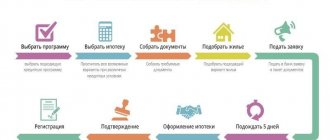Make sure you are age appropriate
From the bank's point of view, the borrower should not be too young or old. Citizens aged 26 to 30 have the highest chances of getting a mortgage approved
The minimum age to apply is 21 years old.
Officially, a mortgage agreement can be issued at the age of 18, but banks are reluctant to approve such applications. Borrowers who have barely reached the age of majority are most often still in school, do not have a credit history, do not have a permanent source of income - or are working, but their work experience is too short. It is difficult for the bank to assess their creditworthiness and prospects, so it is easier to refuse.
After age 55, your chances of getting approved for a mortgage drop sharply. The older the borrower, the less likely the application will be approved. The borrower's age at the maturity date of the mortgage is often publicly stated in the bank's terms and conditions.
It is better for older borrowers to ask one of their younger relatives to sign up for their loan, if they agree. This is the best way to avoid mortgage problems later in life.
Get your credit history in order
Credit history is a document that characterizes the payment discipline of the borrower. It is compiled by the credit history bureau (BKI). The credit history covers 10 years from the date of its last update. When approving a mortgage, banks carefully check all the information accumulated during this period.
Credit histories contain the following basic information:
- about requests for loans;
- about loans issued or refusals to provide them;
- about open credit cards;
- about surety agreements;
- about current and overdue debts.
If you don't intend to take out a loan in the foreseeable future, it's best not to apply just to see if you'll be approved or not. It’s the same with credit cards, which banks often offer: don’t apply for them unnecessarily, and if you don’t use them, close them.
Check your credit history
Not only banks, but also borrowers themselves can request a credit history. First of all, you need to check your credit history for errors - most often these are unclosed loans and overdue loans. This should be done at least a month before applying for a mortgage in order to have time to correct possible errors.
How to check your credit history:
- Find out which BKI stores your credit history. This can be done online by sending a request to the Central Catalog of Credit Histories of the Bank of Russia through the Gosuslugi portal. Having learned the list of BKI where the credit history is stored, the borrower can request it free of charge twice a year. This is done online through the bureau’s websites.
- Check the information in all bank offices where your credit history is stored - banks can send requests to different organizations.
- If an error is discovered, contact the bureau and write a statement detailing the inaccuracy and requesting that it be corrected. A response must be given within 30 days. If you refuse to make corrections, your only option is to sue the BKI.
A simple absence of debts and arrears in your credit history is already half the success when applying for a mortgage.
Make sure there are no serious delays
With a bad credit history, banks may permanently block your access to a mortgage. Even a minimal delay can become a stop factor - for example, more than five days over the last 10 years. Most banks have less stringent requirements; debt of 60-90 days is considered critical
for your entire credit history or the year preceding your mortgage application.
The only advice here is to repay all loans regularly. What ends up on your credit history will remain there for 10 years.
Improve your credit history
Even a damaged credit reputation can be restored or improved. To do this, you should take out a small consumer loan or get a credit card, make a purchase and repay the loan on time.
A clean credit history is not an advantage; it also requires improvement. If you have never taken out a loan, the bank may consider this a disadvantage, since it will not be able to verify your integrity using specific examples.
For those who have never dealt with loans before, before applying for a mortgage, you can “practice” - for example, take out something relatively expensive on credit for two or three months (TV, refrigerator, computer). With minimal interest losses, you will gain experience in applying for a loan and a positive record in your history.
Will the bank give me a mortgage?
Advice from lawyers:
1. Please tell me: in a three-room apartment, one of the rooms belongs to me and my minor brother. Will the bank give a mortgage to buy the remaining two rooms?
1.1. — Hello, have you contacted the bank? These issues are resolved ONLY by the BANK ITSELF, and not by the site’s lawyers. Good luck to you and all the best.
Did the answer help you?YesNo
1.2. It may or may not give. It depends on the bank and its conditions when issuing a mortgage loan. If this bank won't let you, contact any other bank.
Did the answer help you?YesNo
1.3. The bank either gives you a mortgage or doesn’t, it doesn’t matter whether you are buying an apartment: a single room or two rooms. The main thing, centuries. must meet the bank's requirements. In the case of a mortgage, these 2 rooms will not be your property until you pay it off and these rooms will be used as collateral for the mortgage.
Did the answer help you?YesNo
Consultation on your issue
8
Calls from landlines and mobiles are free throughout Russia
2. Will the bank give me a mortgage if I am a non-working mother of a minor (5 years old) disabled child and receive only minimum alimony, care allowance and pension for a disabled child? No work experience.
2.1. If you are suitable for the bank as a borrower, the bank will issue a mortgage. If you draw up an agreement and have a down payment, your chance of getting a mortgage will be higher.
Did the answer help you?YesNo
2.2. Anna, good evening! A mortgage requires monthly interest and principal payments. According to the indicators that you indicated, you are not able to bear such expenses. A mortgage loan with such financial indicators can hardly be issued to you by the bank, but even from the point of view of your interests it is not beneficial for you. If you fail to make the next payment, you will be charged an additional penalty, which increases the monthly payment amount and ultimately the bank will take the apartment to cover the resulting debt, despite the fact that your child is disabled. In your case, a mortgage is only possible if the state compensates you for part of the interest paid.
Did the answer help you?YesNo
3. Will banks give a mortgage for an unfinished individual housing construction cottage within the city, with communications installed near the land plot, with conditions, if without a down payment and without collateral for other real estate? And if they do, what will be the terms of this mortgage? Thank you.
3.1. It is up to the bank to give or not to give a loan and on what conditions; the bank cannot be limited in this and cannot be obliged to any conditions.
Did the answer help you?YesNo
3.2. Hello, to get an answer to your question, you need to contact the bank directly where you plan to apply for a loan. Good luck and all the best.
Did the answer help you?YesNo
4. I want to sell a 2-room apartment. The apartment is 57 square meters. The share is 1/4 for the minor, 1/2 for the minor and 1/4 for the spouse. In return, we want to take out a mortgage on a private house or 3-room house. Apartment. Will the guardianship allow the transaction and will the bank give a mortgage? Thanks in advance.
4.1. You can submit an Application (2 copies) to the bank, the main thing is that your copy is stamped with a seal, input. No. and signature, if they refuse to accept it, you can send the Application by registered mail with notification and inventory.
Did the answer help you?YesNo
4.2. Guardianship has nothing to do with it, but in the bank it will be more difficult.
Did the answer help you?YesNo
5. We want to buy half of the house from our neighbors using a mortgage. Will the bank give a mortgage if the owner of the house is then alone?
5.1. Hello. From a legal point of view, there are no obstacles.
Did the answer help you?YesNo
5.2. The bank should not refuse everything legally.
Did the answer help you?YesNo
6. Will the bank give a mortgage for the purchase of housing using maternity capital, with a very bad credit history?
6.1. Good afternoon It all depends on the bank, but most likely not.
Did the answer help you?YesNo
6.2. Find a good realtor, then you might get it.
Did the answer help you?YesNo
7. Will the bank give a mortgage for finished housing if the apartment we want to buy has undergone redevelopment, but according to the documents it is officially registered? Thank you!
7.1. If the redevelopment is legalized, then this cannot be a basis for refusing to provide a mortgage loan. But this is all at the discretion of the bank.
Did the answer help you?YesNo
7.2. My client literally rented just such an apartment six months ago. The Bank did not know that the redevelopment was illegal, and the appraiser did not notice it. The mortgage was arranged properly.
Did the answer help you?YesNo
8. If a person is subject to enforcement proceedings, will the bank give a mortgage for the purchase of housing using Maternity Capital? Thanks for the answer!
8.1. The presence of enforcement proceedings characterizes the credit history and solvency of a citizen from the negative side, so everything depends on the decision of the bank.
Did the answer help you?YesNo
9. The house is valued at half a million. The owners want two million. Will the bank give a mortgage for that amount if the appraisal is much lower?
9.1. The bank accepts an adequate assessment with an overstatement of no more than 15%
Did the answer help you?YesNo
10. Good day! Tell me please! Will banks give me a mortgage if I buy an apartment under 2 contracts, on the same day, that is, from 2 owners?
10.1. Hello Roman! I think they will. In any case, the conditions for lending are set by the bank. You should contact the bank to apply for a mortgage.
Did the answer help you?YesNo
11. We buy a house with a Sberbank mortgage. A problem has arisen: in the certificate of ownership, extract from the Unified State Register and cadastral extract, there is a discrepancy in the area of the house by 4.1 sq.m. This is an attached toilet to the house. Will the bank give a mortgage or do all the documents need to be brought into compliance, how to do this. Time is running out. Thank you in advance.
11.1. Dear Konstantin, after applying for a mortgage loan, the house will be pledged to the bank and it will be difficult, to put it mildly, to carry out any registration actions to bring it into compliance. The question is more for the bank employees.
Did the answer help you?YesNo
12. We have an approved mortgage, we are looking for a suitable house, we liked one very good house, but it was purchased using maternity capital, 2 children are the owners. Will the bank give a mortgage for such a house and what additional documents will need to be provided?
12.1. You will need the sellers to provide permission from the guardianship authorities to sell the children's shares.
Did the answer help you?YesNo
Pay off all loans and debts
An increased credit load almost always leads to refusals. Based on credit history, a special Debt Burden Indicator (DLI) for individuals is even calculated, which also affects the chances of approval of a mortgage application.
When repaying any loans, be sure to contact the bank for a certificate stating that full payment has been made on the loan and the organization has no claims against you. This is an additional guarantee in case of errors.
Before applying for a mortgage, take the time to check yourself for all possible types of debt through the services of the State Services portal:
- car fines;
- legal debt;
- tax debt;
- utility debts.
All pending fines and penalties, utility bills and tax debts are visible in your credit history. It would be better if, when checking, the bank does not come across such “sins” of the borrower.
Do not take loans from microfinance organizations (MFOs)
Banks a priori believe that citizens who use microloans have poor management of their income and are unable to pay their mortgage, despite the fact that they can pay them regularly. The very fact that the borrower used this service is a reason for the lender to doubt his financial situation.
How does an outstanding loan affect your ability to get a mortgage?
The fact that the client has an existing loan already gives the lender certain ideas about the solvency and reliability of the potential borrower. Banks are more active in providing loans to people who have previously taken out loans than to those who have never used these banking services in their lives, however, there are also negative aspects of the impact of an existing loan on access to obtaining a mortgage:
- Since the borrower can pay only part of his official income for loan obligations, the size of the loan issued will be smaller.
- A mortgage with an existing loan is not provided if the borrower has current arrears (even minimal delays in loan payments).
- Banks, before approving an application, more carefully assess their risks associated with possible losses from providing a loan.
- An outstanding loan is an additional burden placed on the borrower, which is why large loans are often refused.
- Most likely, the lender will offer the client a higher interest rate under the mortgage lending program for the purchase of real estate.
- If you have existing loans, you will need to take out a full-fledged insurance policy against possible risks.
Despite the fact that if there is a mortgage or other loan, the lender has a more complete picture of the borrower, since all the information is already contained in the credit history bureau, for a financial institution the presence of a large loan with a client is quite a high risk. This is due to the possible emergence of financial instability in a citizen who has to pay off two large loans at once.
Important! If a lender has doubts about a client's ability to pay on an existing loan, they can increase their chances of loan approval by providing proof of additional income.
Save up a down payment above the minimum
The minimum down payment on a mortgage that most banks work with is 15-20% of the price of the apartment. If you want to increase your chances of getting a loan approved, try to save more than this amount. Ideally, half the cost of housing. This will show the bank that you can manage your income rationally and will be a reason to improve the terms of the loan.
If your savings are less than the minimum down payment threshold, if possible, it is better to postpone applying for a loan, or ask for financial help from relatives or friends.
Maternity capital can help you save for a down payment—since January 2020, it is given for your first child. The vast majority of banks accept certificates for payment. But remember that for the creditor, a new addition to the family means the appearance of a new dependent, which may influence the creditor’s decision not in your favor.
A number of banks have mortgage programs without a down payment, but there are very few of them, and the conditions are much less favorable - the interest rate is usually 1-2% higher than the base one. But if new housing and a mortgage are vital, with this option there is a greater chance of approval of the application.
What factors influence the approval of an application?
After applying for a loan, there may be 3 options for the development of events, on which the answer the client will receive depends:
- The loan application was accepted, but the client did not sign the agreement. In this case, the bank and the borrower do not owe each other anything, which means there should be no problems. It is enough to call an employee of a financial institution by phone and inform them that you no longer need their services, or pay a visit to the bank building.
- The agreement has been signed, but the loan funds have not yet been received. Here everything is a little more complicated, since refusal is a very unfavorable situation for the lender, since he loses his income from interest. The bank will put all possible pressure on the client, manipulating that the agreement has already been signed. However, it is worth remembering that the transaction comes into force after receiving the funds, which means the borrower has the right to refuse the loan. This is stated in the legislation of the Russian Federation.
- The worst situation for the borrower is when the papers are signed and the money is received. In this case, the chance of approval of the application for refusal is practically equal to 0. You will have to rely on the human factor - if the employees can understand your situation and agree to help you. It is worth remembering that the bank loses its income when it loses a client, which means you should not hope for approval of the application.
The best way out of this situation is to try to repay the loan early. This way you can save on interest charged to the lender. To do this, you need to carefully read the terms of the deal. These may include restrictions on early repayment of the loan.
If you give up your mortgage, nothing bad will happen, but will you be able to do it? In any case, it’s worth a try, since there is always a small chance, even if the funds have already been paid.
Make sure your profession meets the bank's requirements
This is roughly how banks treat different professions when approving mortgage applications:
| Professions with a high probability of mortgage approval | Occupations least likely to be approved for a mortgage |
|
|
Following the coronavirus pandemic in 2020, banks are wary of considering mortgage borrowers who are employed in affected industries—hotels, sports and fitness organizations, and catering establishments.
When checking the borrower, the lender also checks information about his employer. He pays special attention to the following:
- contributions to pension and other funds;
- regularity of tax payment;
- presence/absence of bankruptcy and seizure of the company’s property.
Separately, it is worth mentioning the work experience of the borrower. The total working experience of the mortgage applicant must be at least one year. Work experience at the last place of work is at least three to six months, depending on the requirements of a particular bank.
Estimate and confirm your official income
All borrower income is assessed by banks in aggregate, but is divided into basic and additional. The main ones are, first of all, a salary from a stable job or profit from an established business. Without them, getting approval is much more difficult.
The income must be regular and necessarily official. The bank will definitely not take into account the salary “in an envelope”.
Make sure that the monthly payment on the future mortgage does not exceed 40-60% of the total official income (the sum of basic and additional income). Banks have a separate requirement for this.
Sources of income that are usually taken into account by banks:
| Source of income | Supporting documents | Where to get it |
| Main place of work | – certificate 2-NDFL; - certificate from the accounting department. | – at the tax office; - in the accounting department at the place of work. |
| Part-time work | ||
| Entrepreneurial activity without legal education persons (IP) | declaration for the tax or other period specified by the bank | at the tax office |
| Professional income (for self-employed citizens) | electronic income statement | in the personal account of the Federal Tax Service “My Tax” through the “Certificates” section |
| Pension income | certificate of pension paid for the last month | in a pension fund or in the MFC |
| Income from rental/rental agreements | 3-NDFL certificate with attached copy of the rental agreement | at the tax office |
Keep in mind that a pension cannot be your only source of income when considering a mortgage application. Those who live only on rent money will also have to work hard to earn the favor of the lender. It is better when pensions and/or rent are taken into account not as the main income, but as additional income.
Income that banks do NOT take into account when approving a mortgage
- income from investing in securities (dividends, coupon income, etc.);
- insurance payments;
- income from participation in LLC and dividends on placed shares in JSC;
- income from purchase and sale transactions of currency, securities, goods, movable and immovable property, property rights, etc.;
- winnings and prizes from participation in gambling and lotteries;
- fines, penalties and penalties received;
- bonus payments and remuneration, except for payments received at the main place of work/part-time place of work;
- state benefits (except for temporary disability benefits);
- alimony;
- scholarships;
- donor rewards, etc.
What documents are needed for a mortgage?
Loan specialists will tell you in detail what documents you need to collect to obtain a mortgage loan. As a rule, this is a 2-NDFL certificate from your employer, certified by him, a copy of the work record book, a copy of the employment contract, education documents, a marriage or divorce certificate, an insurance certificate of state pension insurance, a TIN certificate, copies of children’s birth certificates, a passport . Men of military age will also need a copy of their military ID. Based on your documents, a bank specialist can make an approximate calculation of how much loan you can count on from this bank.
List all your additional assets
The possibility of mortgage approval will increase if the borrower owns any assets or valuables - provided that they are not already pledged.
The following can be considered as assets:
- automobile;
- an apartment or a share in it;
- non-residential real estate (garage, cottage, storage room, parking space);
- bank deposit.
A separate account for a more or less decent amount (for example, 300-400 thousand rubles) will definitely not be superfluous. When applying for a mortgage, in any case, you need to have a “safety cushion” that would be enough to pay off at least six monthly payments.
Interest on deposits is considered as an additional benefit. The amount deposited in the account should be large enough to attract the bank's attention - and at the same time not greatly influence the overpayment. Otherwise, it is better to add this money to the down payment.
Take a co-borrower or guarantor
If it is difficult for you to take out a mortgage for the required amount, you can share this burden with a co-borrower or guarantor. No more than three persons from each category can participate in one contract.
Co-borrower
- this is a person who will bear joint responsibility with the borrower to the bank and repay the loan.
If there is a co-borrower, the lender will consider his income along with yours as a borrower - but also debts. Therefore, when involving someone in a mortgage, make sure that this person is not included in the “risk group” - has no criminal record, has paid off all loans and taxes, has not been in arrears, and is in a stable financial position. Relatives - brothers and sisters, parents - are most often involved as co-borrowers. They must submit the same documents to the bank as the borrower.
Officially married spouses automatically become co-borrowers.
Banks favor family borrowers, especially if both spouses work and earn income. If one of the married couple refuses to be a co-borrower (or, for example, he/she has a bad credit history), it is necessary to draw up a prenuptial agreement in advance. There you can document the terms of liability to the bank in the event of a divorce.
Guarantor
is the person who will pay the debt on your behalf if you are unable to repay it.
The difference between a co-borrower and a guarantor is that the first begins to repay the loan together with the borrower, and the second only when the borrower is no longer able to repay the debt. The requirements for guarantors are the same as for co-borrowers. When applying for a mortgage, the guarantor sends the same package of documents to the bank as the borrower.
What problems do borrowers face?
You must read the terms and conditions of mortgage loans very carefully. Often banks, wanting to attract a client, promise low interest rates, and only indicate in small print what needs to be done to obtain a low annual interest rate. Sberbank is no exception. The borrower may face a number of unpleasant obstacles.
- The minimum interest rate stated in the tariffs is available only to “salary earners” and bank employees, and those who have entered into a personal insurance agreement. In other cases, supplements are provided to the basic annual rate.
For clients who do not fall into the salary category and who refuse life and health insurance, the base interest rate will increase by at least 1.5 points.
- If you confirm income with a certificate in the bank’s form, then the lending period and the approved credit limit can be reduced, and the bank’s remuneration, on the contrary, increased.
- The cost of insurance is quite high. Employees are urged to insure the collateral, life and disability by contacting a company recommended by Sberbank.
- If minor shortcomings are identified, the bank does not take the client’s position and immediately refuses the accepted application.
These are the conditions under which mortgages are issued at Sberbank. There are some disadvantages, but they are mitigated by the low annual rate and impeccable service. Clients highly value not only the reliability of the financial institution, but also the convenience of making payments into the account and the possibility of early closure of mortgage debt without additional fees.
Submit applications to several banks at once
The surest way to increase your chances of loan approval is not to limit yourself to a single bank. Most often, borrowers do this - they send one main application to the place where they would like to get a mortgage first, and together a few more “to be on the safe side.” But the main thing here is not to overdo it.
no more than three to five mortgage applications per month
Each such request is reflected in the credit history. If there are too many applications, the bank may regard this as panic and financial problems for the borrower.
Submitting an application to several banks at once will at least save you time. If one creditor refuses, you can wait for the results of other requests. When you submit an application to only one bank, if it is rejected, you can submit a new application there only after two months.
It is quite possible that you will end up getting approved for several applications at once from different banks. Then you will be able to choose the option with the most favorable conditions.
But there is also the other side of the coin - if three applications in a row are rejected, this can become a stopping factor for banks. But this happens extremely rarely - when mortgages are requested by obviously insolvent people or people on stop lists with a bad credit history or criminal record.
Be careful when submitting applications
Inattention and a frivolous attitude towards filling out the application form and submitting documents for a mortgage can play a cruel joke. Banks refuse loans even for the most insignificant, at first glance, reasons - there is no signature here, there the name is written in lowercase, here the data does not match. The result is a rejected application.
Typical mistakes of borrowers that can lead to mortgage denial:
Concealment or substitution of information.
Banks check all information about the borrower through many databases - you cannot hide from them either a criminal record or the presence of children. When filling out the form, answer the questions honestly and be willing to confirm the information.
Errors and inaccuracies in documents.
Any typo or correction in an official document - and the bank can easily refuse a loan. Inaccuracies can be corrected, but the fact of refusal will forever remain in your credit history. Therefore, be sure to check basic information such as full name, contact details and job information, and the relevance of certificates.
Reminder: how to increase your chances of getting a mortgage approved
- make sure you are the right age
(if you are under 21 years old, delay your application if possible; the best age for a mortgage is from 26 to 30 years old; if you are over 55 years old, the chances of getting approval are sharply reduced); - put your credit history in order
(request your credit history; make sure there are no serious delays or errors; if necessary, improve your credit history by taking out and repaying a loan; pay off all existing loans, debts and fines; do not take microloans from microfinance organizations); - save up a sufficient down payment
(the more you save, the better; if you don’t have enough money, borrow from relatives or friends, or try applying for a program without a down payment); - make sure that your job meets the bank's requirements
(take into account the nature of your job when submitting a mortgage application - hazardous professions, industries affected by the coronavirus and entrepreneurs are rejected more often; confirm a total work experience of at least one year and at least three to six months of experience at the last place of work; make sure that the employer pays taxes regularly and is not on the verge of bankruptcy); - estimate and confirm your official income
(document your income; compare your total income with your mortgage payment and make sure that no more than 50% of your earnings are spent on a loan); - indicate all your additional assets
(tell the bank about all your property and savings, make a separate deposit in the bank for 300-400 thousand rubles for a “safety cushion”); - get a co-borrower or guarantor
(the co-borrower will pay the mortgage together with you; the guarantor will be able to pay the debt if you are unable to do so). - submit applications to several banks at once
(fill out applications to two or three banks per month, no more; do not submit applications “just like that” if you are not going to take out a loan); - Be careful when submitting applications
(check the application and documents for inaccuracies, errors and typos; write only the truth in the application and do not hide anything).
How to refuse a mortgage?
A mortgage is a type of loan, which means you can refuse it in the same way as a regular loan. However, it is worth remembering that this scenario is very unfavorable for the lender, which means some difficulties may arise.
If the purpose of the refusal is to receive the funds paid, then you need to prepare for many checks. The bank will check not only the credit history of a possible borrower, but also information from his place of work, as well as information about the total income of the family and relatives.
Most often, there are no problems with receiving funds from a financial institution, since it is ready to pay the funds in case of refusal. To do this, you need to submit an application and wait for a positive response.
Important! The lender is ready to terminate the agreement only if an official agreement has not been signed and the client has not received the loan amount. Otherwise, some difficulties may arise.










